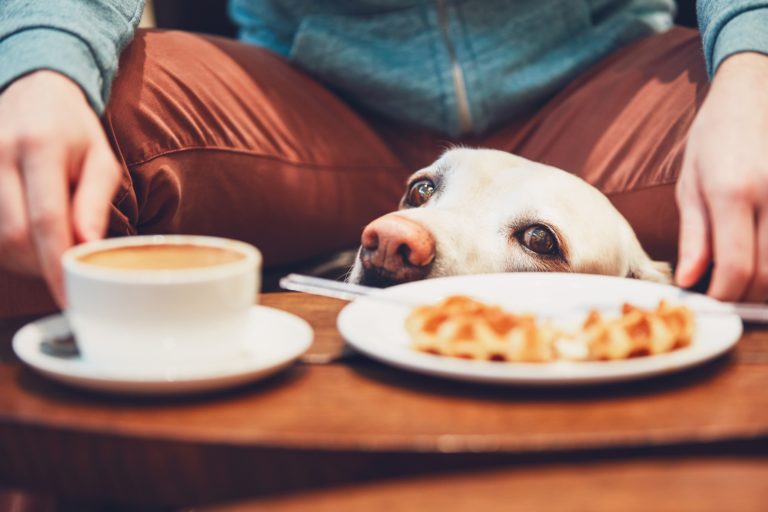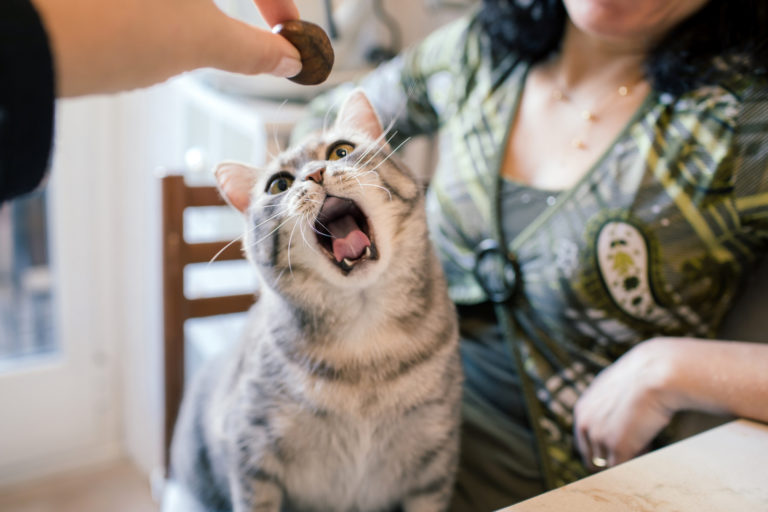When you love someone you want to make them happy, and in the case of our pets, we try to give back a bit of the joy that they provide on a daily basis! So when our food-motivated friends look at us with those wide, begging eyes as we’re eating a snack, it’s only natural to want to share. But think twice before giving your pet table food because some may be dangerous.

While there are plenty of “human foods” that are safe for our pets, many of the things we enjoy can be unhealthy, or even toxic to our beloved dogs and cats. Below, you’ll find some common foods that you should never feed your canine or feline pals, and while this list is by no means exhaustive, it’s a good place to start.
Foods that are dangerous to dogs:
- Chocolate – the darker the chocolate, the more toxic it is
- Caffeine – in drinks or foods
- Macadamia nuts – beware of these in baked goods
- Beer and alcohol – the alcohol itself is dangerous, plus hops (in beer) and grapes (in wine) are also toxic
- Grapes – this includes raisins and currants, which can cause kidney failure
- Fruit pits – many pits and seeds contain cyanide and also pose a choking hazard
- Xylitol – this artificial sweetener used in sugar-free foods and gums can be deadly
- Garlic, onions and leeks – beware of feeding foods containing these ingredients, even if they’re dried or dehydrated
- Cooked bones – these can splinter and pose a choking hazard or even perforate digestive organs
- Artificial flavors, dyes, or preservatives – be on the lookout for dog foods and treats that contain these ingredients, too
Foods that are dangerous to cats:
- Chocolate – the darker the chocolate, the more toxic it is
- Caffeine – in drinks or foods
- Tuna – a little is fine for a treat, but as a dietary staple, it doesn’t contain enough essential nutrients and can even cause mercury poisoning
- Alcohol – their bodies are much smaller than ours, and just a few gulps can cause poisoning
- Grapes – this includes raisins and currants, which can cause kidney failure
- Xylitol – this artificial sweetener used in sugar-free foods and gums can be deadly
- Garlic, onions and leeks – beware of feeding foods containing these ingredients, even if they’re dried or dehydrated
- Cooked bones – these can splinter and pose a choking hazard or even perforate digestive organs
- Artificial flavors, dyes, or preservatives – be on the lookout for cat foods and treats that contain these ingredients, too
- Dog food – a nibble here and there is okay, but never replace your cat’s meals with the dog’s kibble — they could become nutrient-deficient.

If you’re ever unsure of whether a food is safe for your pet, a quick Google search should tell you whether or not it’s generally safe. (Remember that every animal is different, and yours may have allergies or sensitivities to certain types of foods, including dairy, corn, and grains. In any case, caution and moderation are key!)
Your safest bet is always to consult with your vet or simply err on the side of caution and refrain from sharing a new food with your pal. If you think they’ve ingested something toxic (especially in large amounts), call your vet or local emergency vet immediately, or dial up the ASPCA Poison Control hotline at (888) 426-4435.
